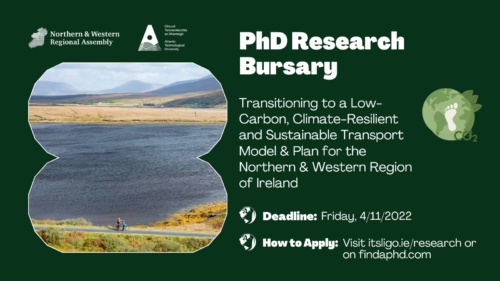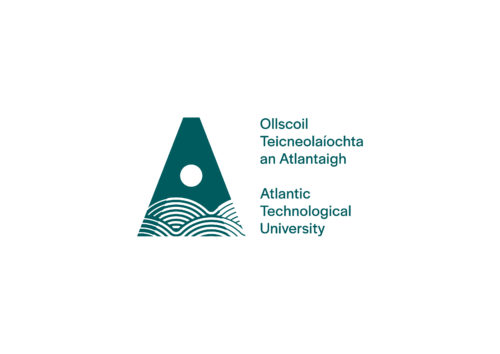Home » ATU SLIGO CUA & NWRA Research Bursary 2022
Project title: Transitioning to a Low-Carbon, Climate-Resilient and Sustainable Transport Model & Plan for the Northern & Western Region of Ireland.

The Project awards will include:
- A CUA stipend topped up by the North and Western Regional Assembly valued at €18,000 per annum
- Support for travel, consumables and dissemination expenses
The research project will be conducted under the supervision of Dr Brian McCann (ATU Sligo) and Dr Amaya Vega ( ATU Galway).
Please note the closing date for applications is Friday 4th November 5pm (GMT).
Completed applications and scanned supporting documents must be emailed to sean.walker@nullatu.ie only.
Project Description
Dispersed settlement patterns and low population density are typically found in rural areas, contributing to a high proportion of journeys being made by private car. The Northern and Western region is highly dependent on the private car for travel to work and education. This is reflective of the low level of suitable alternative transport modes available and the dispersed and low level of urbanisation in the region. Ireland’s 2030 decarbonisation ambition will require addressing one of the key regional challenges: the provision of sustainable transport options both within and between our urban and rural areas to reduce high levels of car dependency. The focus of this project is to investigate and advance the transition of the Northern and Western Region of Ireland into a low-carbon, sustainable and connected transportation system in line with national and global climate action and sustainable development targets. The work will be carried out as a cross-college partnership between ATU Sligo and ATU Galway/Mayo with the support and guidance from key regional public sector bodies. The research will apply a mixed methods approach in which both qualitative and quantitative data will be collected and analysed. This position offers an exciting opportunity for the candidate to obtain a PhD degree and to make a substantial contribution in the field of sustainable transport research in a regional/rural context.
This project aims at understanding the socio-spatial differences in attitudes towards electric vehicles in the Northern and Western region of Ireland. Previous research for Ireland on battery electric vehicles adoption factors suggests that early adopters tend to aggregate in suburban neighbourhoods associated with longer commutes, and greater income, home ownership levels, education levels, social status, and age (Mukherjee, S. C., & Ryan, L., 2020). The current project will contribute to further understanding adoption by investigating attitudes at the micro level using survey data. A comprehensive analytical framework will be developed in the region to estimate generational differences as well as spatial effects in attitudes towards adoption of EVs, and the use of other forms of sustainable travel, such as public transport, cycling and walking (active travel) in the region, with particular focus on the disparities between rural, semi-rural and urban locations. Ultimately, the objective is to assess whether attitudinal disparities towards EVs are likely to influence adoption over time and to understand the implications for policy. The project will provide valuable inputs for policy development in promoting sustainable transport in the Northern and Western region and the implementation of its Regional Economic and Spatial Strategy. The study shall investigate and provide guidance for regional authorities on how the Regional Policy Objectives in the current strategy, relating to the transition to low-emission and sustainable travel alternatives from the current high dependency on fossil fuel powered vehicles, can be delivered in line with national and global climate action targets.
A significant part of the work will entail the collaboration and engagement with stakeholders in the region including the Northern and Western Regional Assembly who are part-funding this project.
Research Candidate Specification
The applicant is required to hold an undergraduate Honours Bachelor or postgraduate taught Masters’ degree in an appropriate discipline such as Civil or Transport Engineering, Land Use, Urban, Regional or Environmental Planning, Geography, Economics, Sustainable Development, Environmental Economics or Transportation Planning.
The preferred applicant should possess or be equipped to develop advanced statistical and mathematical modelling skills, be able to work independently, and have excellent communication skills and experience and knowledge of sustainable transport policy and rural/regional planning, stakeholder engagement, statistical analysis, microeconomic theory, and econometrics.
